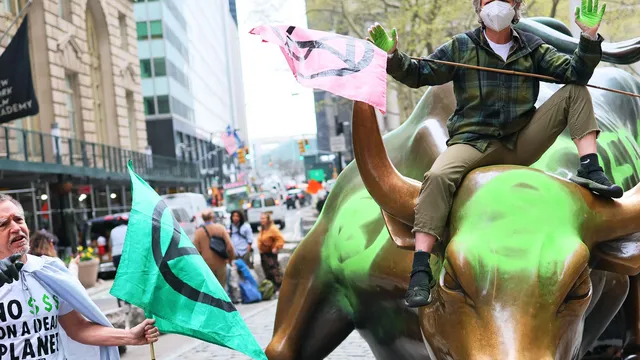
Climate activists vandalize Wall Street Bull with powerful message
2025-04-24 16:49- On April 22, 2025, Extinction Rebellion spray-painted the Wall Street Bull statue.
- The phrase 'Greed = Death' was used to criticize corporate greed during Earth Day protests.
- The vandalism sparked discussions about environmental accountability and the role of Wall Street in climate change.
Express your sentiment!
Insights
On April 22, 2025, climate activists from the group Extinction Rebellion targeted the iconic Wall Street Bull statue located in Bowling Green park, near the New York Stock Exchange. This act of vandalism occurred during the 56th annual Earth Day demonstrations, which first began in 1970. The activists spray-painted the bull with neon green paint, inscribing the phrase 'Greed = Death' onto the statue, which represents a surging financial market. This action was part of a larger protest aimed at highlighting the detrimental impact of corporate greed on the environment and future generations. The group's choice of the Wall Street Bull holds significant symbolic weight, as the statue has long been associated with financial prosperity and capitalism. The protesters aimed to showcase their disdain towards Wall Street’s practices, which they claim prioritize profits over ecological sustainability. By appropriating such a recognized symbol, they sought to draw attention to their message and challenge the narratives pushed by the financial elite. Demonstrators communicated their motives on social media, stating, 'We came to Wall Street to call out the bulls---,' referring to the misleading claims made by those in power that overlook pressing climate issues. The event transpired not only as a demonstration but also as a means for activists to articulate widespread frustrations about governmental and institutional inaction regarding climate change. After the act of vandalism, some members attempted to clean the graffiti off the bull, reinforcing the duality of their protest: making a statement while also acknowledging the need for dialogue and resolution following their confrontation. This vandalism has not occurred in isolation; the bull has been a frequent target for activists and has endured similar protests in the past. The actions taken by Extinction Rebellion reflect a growing urgency and anger surrounding climate issues and the systemic failures attributed to corporate interests. Across social media and other platforms, discussions have erupted regarding the adequacy of actions taken to combat climate change in comparison to the urgency of the situation. By vandalizing one of Wall Street’s most recognizable symbols, the activists aimed to spur conversations about sustainability, accountability, and the significant consequences of the 1% who 'gamble with our futures.'
Contexts
The impact of climate activism on financial markets has become increasingly significant as more investors and corporations integrate environmental, social, and governance (ESG) factors into their decision-making processes. With climate change presenting urgent risks and opportunities, market participants are paying closer attention to how climate activism influences corporate behavior, investor sentiment, and ultimately, financial performance. This shift is evidenced by the growing number of shareholder resolutions and proxy votes focused on climate-related issues, as well as the rising value and volume of ESG investments. Activist groups have effectively pressured companies to adopt sustainable practices, which can enhance their profitability and minimize risks, shaping overall market trends in various sectors. Climate activism has prompted many financial institutions to reassess their portfolios, leading to a more significant allocation of capital towards sustainable companies and away from those involved in fossil fuels or environmentally harmful practices. This transition not only reshapes company valuations but also challenges traditional metrics of performance, as financial markets are no longer solely focused on short-term profits. Research indicates that firms with strong ESG performance often exhibit lower cost of capital and better resilience during economic downturns, reinforcing the connection between sustainability practices and financial stability. Additionally, climate-related disclosures, such as those outlined by the Task Force on Climate-related Financial Disclosures (TCFD), have become essential for investors seeking transparency in assessing the long-term viability of their investments. Furthermore, climate activism plays a critical role in shaping regulatory frameworks and global climate agreements that directly affect financial markets. Governments and regulatory bodies are increasingly introducing policies that mandate climate risk reporting and align financial flows with sustainable development goals. As a result, companies are prioritizing climate mitigation strategies, incorporating carbon pricing into their operations, and enhancing their disclosures to meet regulatory expectations. This growing regulatory pressure has fostered a heightened awareness among investors about climate risks, encouraging them to advocate for corporate accountability and responsible investment practices. The consensus among economists and financial experts is that climate activism is reshaping financial markets by aligning them more closely with the realities of environmental challenges. As the impacts of climate change become more pronounced, the integration of sustainability considerations into investment decisions is expected to accelerate, leading to the emergence of new business models and investment opportunities. Consequently, the ongoing evolution of financial markets in response to climate activism not only reflects societal changes towards sustainability but also signals a fundamental shift in how businesses operate and are valued. This trend is likely to intensify in the coming years, as both public sentiment and investment strategies increasingly favor those entities committed to the long-term stewardship of our planet.